NEWEST! During her talk, Arlie mentioned that she had a couple of suggestions on how to improve the current political and social situation. You can now download a PDF of those ideas. Read it and act!
NEW! The audio recording of the talk and Q&A session is available for your listening pleasure. Give it a listen!
Some Images From the Talk
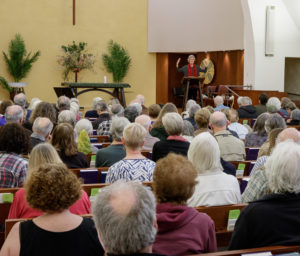
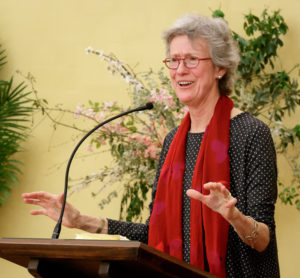
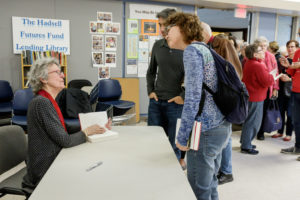
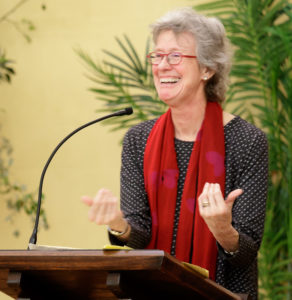
About the Talk
On Sunday, February 12th at 3pm, University of California sociologist Arlie Russell Hochschild visited MPC to discuss her bestselling book Strangers In Their Own Land: Anger and Mourning on the American Right. The book is a study of rural conservative voters in Louisiana, examining the question of why they (apparently) vote against their own interests by selecting candidates — including Tea Party officials and Donald Trump — who want to remove society’s “safety net”.
This event was free and open to the public.
About Arlie Hochschild
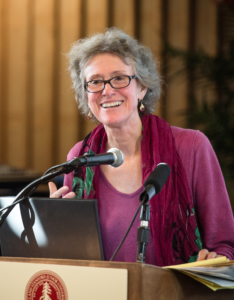 Arlie Russell Hochschild is an American sociologist and academic. She is professor emerita of sociology at the University of California, Berkeley. Hochschild has long focused on the human emotions which underlie moral beliefs, practices, and social life generally. She is the author of nine books including, most recently Strangers In Their Own Land: Anger and Mourning on the American Right, a finalist for the National Book Award, and The Second Shift, The Managed Heart, and The Time Bind. In the tradition of C. Wright Mills, Hochschild continually tries to draw links between private troubles and social issues. […] Within sociology she is known as the founder of the sociology of emotion and, outside of it, as a contributor to the New York Times op-ed page and Book Review, Mother Jones, The American Prospect, Harper’s Magazine, and The Progressive. Hochschild has become a public sociologist because her work has influenced audiences outside of the academy. […] “Hochschildian sociology” reflects a concern with the private life of the individual, which includes the family and children. This sociology focuses on the nature of human relationships and the obligation, emotion, and care that bring people together in all parts of life. Hochschildian sociology works to understand how the personal, private, and familial parts of a person’s life continues to be altered by institutions like the workplace, or by forces of commodification that operate globally. (source: wikipedia.org)
Arlie Russell Hochschild is an American sociologist and academic. She is professor emerita of sociology at the University of California, Berkeley. Hochschild has long focused on the human emotions which underlie moral beliefs, practices, and social life generally. She is the author of nine books including, most recently Strangers In Their Own Land: Anger and Mourning on the American Right, a finalist for the National Book Award, and The Second Shift, The Managed Heart, and The Time Bind. In the tradition of C. Wright Mills, Hochschild continually tries to draw links between private troubles and social issues. […] Within sociology she is known as the founder of the sociology of emotion and, outside of it, as a contributor to the New York Times op-ed page and Book Review, Mother Jones, The American Prospect, Harper’s Magazine, and The Progressive. Hochschild has become a public sociologist because her work has influenced audiences outside of the academy. […] “Hochschildian sociology” reflects a concern with the private life of the individual, which includes the family and children. This sociology focuses on the nature of human relationships and the obligation, emotion, and care that bring people together in all parts of life. Hochschildian sociology works to understand how the personal, private, and familial parts of a person’s life continues to be altered by institutions like the workplace, or by forces of commodification that operate globally. (source: wikipedia.org)
About Strangers In Their Own Land
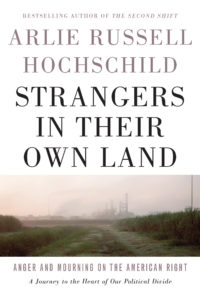 Strangers in Their Own Land goes beyond the commonplace liberal idea that these are people who have been duped into voting against their own interests. Instead, Hochschild finds lives ripped apart by stagnant wages, a loss of home, an elusive American dream–and political choices and views that make sense in the context of their lives. Hochschild draws on her expert knowledge of the sociology of emotion to help us understand what it feels like to live in “red” America. Along the way she finds answers to one of the crucial questions of contemporary American politics: why do the people who would seem to benefit most from “liberal” government intervention abhor the very idea? (source: goodreads.com)
Strangers in Their Own Land goes beyond the commonplace liberal idea that these are people who have been duped into voting against their own interests. Instead, Hochschild finds lives ripped apart by stagnant wages, a loss of home, an elusive American dream–and political choices and views that make sense in the context of their lives. Hochschild draws on her expert knowledge of the sociology of emotion to help us understand what it feels like to live in “red” America. Along the way she finds answers to one of the crucial questions of contemporary American politics: why do the people who would seem to benefit most from “liberal” government intervention abhor the very idea? (source: goodreads.com)
About the Hadsell Futures Fund
The Hadsell Futures Fund was a generous gift from beloved longtime MPC member and Theologian-in-Residence John Hadsell, who died in May 2016. The fund seeks to engage all of us in a conversation about the future of progressive Christianity –– in particular issues that were close to John’s heart: the rise of women’s voices in the church and world; the growing need for interfaith connections; the increasing influence of social media and online communications; the threats posed by climate change; the necessity of engaging and understanding the younger generation; and the need for a constructive conversation between science and religion.
Further Reading
- Arlie Russell Hochschild’s View of Small-Town Decay and Support for Trump (New Yorker Magazine)
- I Spent 5 Years With Some of Trump’s Biggest Fans. Here’s What They Won’t Tell You. (MotherJones)
- How the ‘Great Paradox’ of American politics holds the secret to Trump’s success (The Guardian)
Author photo by Paige K Parsons
